|
|
|
Sort Order |
|
|
|
Items / Page
|
|
|
|
|
|
|
| Srl | Item |
| 1 |
ID:
180002
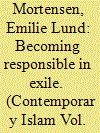

|
|
|
|
|
| Summary/Abstract |
Taking an ethnographic point of departure in the stories of three Syrian middle-class men in Amman, Jordan, in this article, I zoom in on the role of care in the everyday of exile, as I explore the young men’s attempts to be “responsible” young men despite challenging circumstances. Guided by Ahmed’s (2006) notion of lifelines, defined as those which direct us and allow us to find our way (ibid.: 12–14), I demonstrate how gendered norms and notions became objects of reflection and experimentation in exile, both enabling and forcing the young men I worked with to think through other ways of leading life as a man. Finding further inspiration in Naguib’s (2015) and Ghannam’s (2013) works on masculinity and care in the Middle East, I consider care as central to the process of negotiating a masculine identity in general as well as to the reconfiguration of a meaningful masculine position in exile specifically.
|
|
|
|
|
|
|
|
|
|
|
|
|
|
|
|
| 2 |
ID:
180003
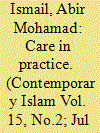

|
|
|
|
|
| Summary/Abstract |
Recent studies conclude that ethnic minority families in Denmark tend to be dismissive of senior housing and municipal homecare services for elderly family members. A large proportion of Muslim minority families in Denmark attach great importance to caring for the elderly as a tradition and prefer to take care of their own elderly family members at home. Nevertheless, the fact that morality, incentives, and obligations in relation to care for the elderly may be legitimized and/or contested with reference to cultural traditions and Islam has not received much attention in current research. In this article, drawing on material from ongoing ethnographic fieldwork among Arab Muslim families in Denmark, I discuss how cultural and religious backgrounds may determine and influence perceptions and behavior regarding care for the elderly. By observing and engaging in the everyday life of an Arab Muslim family, I explore how caring for elderly people with health problems at home raises specific questions about obligations and triggers negotiations across genders and generations. I argue that besides kinship and ethnicity, it is equally important to consider religiosity in an attempt to learn more about how Arab Muslims care for their elderly family members.
|
|
|
|
|
|
|
|
|
|
|
|
|
|
|
|
| 3 |
ID:
180001
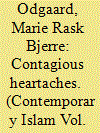

|
|
|
|
|
| Summary/Abstract |
This article studies the relationship between care, family connectivity and queer selfhood in a Muslim-majority context. Based on fieldwork in Amman, Jordan, the article explores how queer people find themselves in demanding circumstances figuring out how to care for—and be responsible to—their family members, whilst caring for themselves at the same time. Drawing partly on Suad Joseph’s patriarchal connectivity and Lotte Meinert and Lone Grøn’s contagious kinship connections, I argue that if we are to understand queer selfhood in Jordanian and other Arab, Muslim-majority contexts in more nuance, we need to look at the relations and emotions at stake in care. Through selected ethnographic cases—in particular one that deals with heartaches—we take a closer look at how queer selfhood is constituted in response to, and up against care and control dynamics in the family. This exposes the interrelated and emotionally contagious qualities of kinship, sexuality and gender. It moves us beyond an understanding of queer subjectivities at the margins of a Muslim community, and towards an understanding of what care and queer selfhood in Muslim and Arab contexts also involves becoming through the hands and hearts of others.
|
|
|
|
|
|
|
|
|
|
|
|
|
|
|
|
| 4 |
ID:
180004
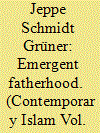

|
|
|
|
|
| Summary/Abstract |
This article explores how new practices and articulations of fatherhood are emerging
among Muslim men in Denmark. With an explicit focus on care as both practice and
ideal, the article accounts for the emergence of new forms of fatherly commitment,
intimacy, and caregiving in domestic life. Drawing on ethnographic material from
different social housing areas in and around the city of Copenhagen, I show how these
new practices and imaginaries of fatherhood are assemblages of both Islamic ethics and
values afforded by the Danish welfare state. Exploring the interlacement of care, Islam,
and fatherhood in Denmark, the article provides a nuanced perspective on the various
social roles of Muslim men as both fathers, sons, and husbands.
|
|
|
|
|
|
|
|
|
|
|
|
|
|
|
|
| 5 |
ID:
179999
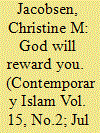

|
|
|
|
|
| Summary/Abstract |
In recent years, Muslims have become more visibly invested in humanitarian work in France. Based on ethnographic fieldwork in Marseille, this article examines local initiatives to care for precarious others whose lives are neither materially supported nor socially recognized within the current French political regime. Engaging with critical French scholarship on humanitarianism as care for others associated with emergency, suffering and the politics of compassion, I show how food-distribution (maraudes) by Muslim-run humanitarian associations also draw from Islamic ethics of care. While social dynamics related to gender, class, race and generation structure the maraudes, the foregrounding of shared precarity, and of religious duty and piety over pity, challenges the ‘hierarchies of deservingness’ established by humanitarian border regimes. In caring for precarious others, Muslims must navigate both the secular suspicion directed towards Islam and the securitization of migration. Carrying out the religious duty of helping those in need, they are ‘laying claim to public space’ for both Muslims and precarious migrants.
|
|
|
|
|
|
|
|
|
|
|
|
|
|
|
|
| 6 |
ID:
179997
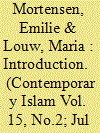

|
|
|
|
|
| Summary/Abstract |
What do we, as human beings—religious, non-religious, Muslim and non-Muslim—care about, and how do experiences of caring and being cared for come to shape the way we lead our lives with and among others? In this special issue, we set out to explore the relations between Muslims and various religious and non-religious others through the concept of ‘care’. Doing this, we dwell specifically on what we describe as tensions in care relations and the way they are experienced, thought of, conceptualized and negotiated: 1) tensions between individual aspirations and care for others 2) tensions between care as duty and care as pleasure and ground for human flourishing 3) tensions between practical and emotional dimensions of care 4) tensions between universal and cultural or ideological aspects of care and 5) tensions between state projects of care and religiously motivated care practices.
|
|
|
|
|
|
|
|
|
|
|
|
|
|
|
|
| 7 |
ID:
179998
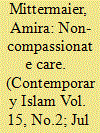

|
|
|
|
|
| Summary/Abstract |
Drawing on fieldwork at a large charity organization in Cairo, this article describes a bureaucratized Islamic ethics of care. Founded in 1975, the Mustafa Mahmoud Association today offers free and discounted medical services, funds micro-projects, and provides financial support to about 10,000 families each year. The bulk of that financial support comes from donors’ private donations in the form of obligatory and voluntary alms (zakāt and sadaqa). By taking a close look at three offices—the donation, intake, and disbursement office—I untangle the regime of care that shapes the daily transactions at this Islamic charity organization. In particular I highlight a significant gap between “caring for” and “caring about.” Donors view caring for those in need as a duty and frequently frame their donations in calculative terms, as a way of “trading with God.” Less central is a language of empathy or compassion. While this seemingly careless care-less? Careless means not careful, sloppy. form of caremight seem cold and heartless, I suggest that it offers a powerful alternative to the liberal illusion of “compassion.”
|
|
|
|
|
|
|
|
|
|
|
|
|
|
|
|
| 8 |
ID:
180000
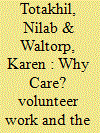

|
|
|
|
|
| Summary/Abstract |
Why care—and care for whom? This article examines how care through volunteer work is ascribed meaning by young Afghan-Danes in a context of various expectations and demands on them from family and peers in Denmark, Afghanistan and elsewhere. Focusing on volunteers in their 20 s, with varying roles of responsibility in volunteer associations in Denmark, we pay attention to different articulations of motivations to engage, and to volunteering trajectories. We discuss how young Afghan-Danes’ engagement is situated in a particular Danish tradition of volunteer work, and how both Denmark and Afghanistan figure prominently in the motivations for volunteering. The young people engage and invest here and there, drawing on ideas of universal humanity and Muslim caring for others in their volunteer efforts, and involvement in politics in Denmark. Young Afghan-Danes find it imperative to ‘give back’, and the care involved in this is primary, while an awareness of building network and bettering the CV exists simultaneously. It is suggested that volunteer work is popular among young Afghan-Danes due to Muslim ethics of care and a Danish tradition of democratic, free (volunteer) associations aligning well, as long as the young Afghan-Danish volunteers choose to downplay friction and contention, and foreground the commonalities between ethical sensibilities and demands in the traditions, they draw on. It is argued that this navigation of expectations and ideas of moral personhood from the Afghan and Danish sides is something they are particularly skilled at due to their specific position and ‘composite habitus’.
|
|
|
|
|
|
|
|
|
|
|
|
|
|
|
|
|
|
|
|
|